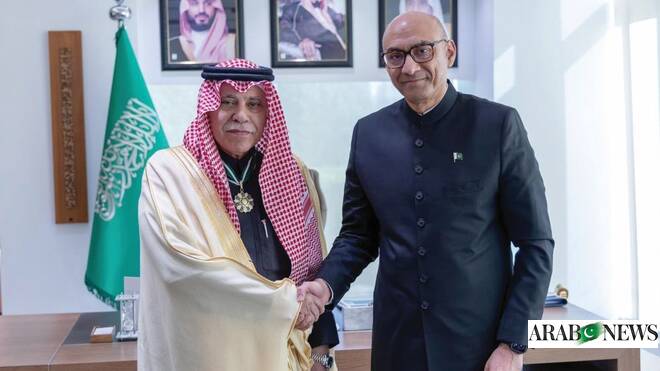India will host the 28th Conference of Speakers and Presiding Officers of the Commonwealth (CSPOC) in New Delhi from Wednesday. The three-day Conference, which will continue till the 16th of January, will bring together Speakers and Presiding…
Category: 1. Pakistan
-
Two terrorists killed in an exchange of fire with Police in Bannu – RADIO PAKISTAN
- Two terrorists killed in an exchange of fire with Police in Bannu RADIO PAKISTAN
- Gunmen kill 4 members of peace committee in KP’s Bannu Dawn
- Police repel militant attack on Bannu post The Express Tribune
- Four peace commitee members killed in…
Continue Reading
-

Pakistan confers second-highest civilian award on Saudi commerce minister for strengthening ties
RIYADH: Experts from more than 50 international and local organizations in education, employment, and artificial intelligence will gather in Riyadh from Jan. 28-29 for the International Conference on Data and AI Capacity…Continue Reading
-
Six police officers martyred in IED blast in Tank – RADIO PAKISTAN
- Six police officers martyred in IED blast in Tank RADIO PAKISTAN
- 6 martyred as police come under attack in KP’s Tank, Lakki Marwat Dawn
- Six policemen, one civilian martyred in K-P IED blast as violence intensifies The Express Tribune
- Bomb blast…
Continue Reading
-
JCP recommends making 4 ad hoc high court judges permanent – Dawn
- JCP recommends making 4 ad hoc high court judges permanent Dawn
- JCP to hold three crucial meetings today The Express Tribune
- JCP confirms four judges for Islamabad, Balochistan high courts Geo News
- Judicial Commission approves appointment of…
Continue Reading
-
NA Speaker seeks nominations for office of Opposition Leader tomorrow – RADIO PAKISTAN
- NA Speaker seeks nominations for office of Opposition Leader tomorrow RADIO PAKISTAN
- NA speaker finally gets the ball rolling on opposition leader’s appointment Dawn
- PTI reiterates demand for Achakzai’s appointment as opposition leader Geo…
Continue Reading
-
Seventy-five Hindu Couples Tie The Knot At Mass Wedding In Karachi – Barron's
- Seventy-five Hindu Couples Tie The Knot At Mass Wedding In Karachi Barron’s
- 76 Hindu couples tie the knot at combined marriages ceremony in Karachi Dawn
- 125 Hindu couples tie the knot at mass wedding The Express Tribune
- Brides and grooms enter a…
Continue Reading
-
'Any ambiguity on terrorism narrative will not be tolerated' – RADIO PAKISTAN
- ‘Any ambiguity on terrorism narrative will not be tolerated’ RADIO PAKISTAN
- Talal Chaudhry tells PTI to ‘go to Afghanistan’ for having ‘so much sympathy’ Geo News
- Khyber Pakhtunkhwa chief minister’s statement on terrorism termed misleading Dunya…
Continue Reading
-
Health Minister emphasizes Pakistan must adopt modern health insurance – RADIO PAKISTAN
- Health Minister emphasizes Pakistan must adopt modern health insurance RADIO PAKISTAN
- Health steering committee reviews UHC for Islamabad, AJK & GB Associated Press of Pakistan
- Mustufa Kamal, Federal Minister for National Health Services,…
Continue Reading
-

New satellite images reveal Russia’s ‘helicopter graveyard’ filling up almost 4 years into Ukraine war – TVP World
- New satellite images reveal Russia’s ‘helicopter graveyard’ filling up almost 4 years into Ukraine war TVP World
- One in 3 Russian Rescue Hubs Lack Aircraft as Carriers Decline Unprofitable State Contracts The Moscow Times
- New satellite…
Continue Reading